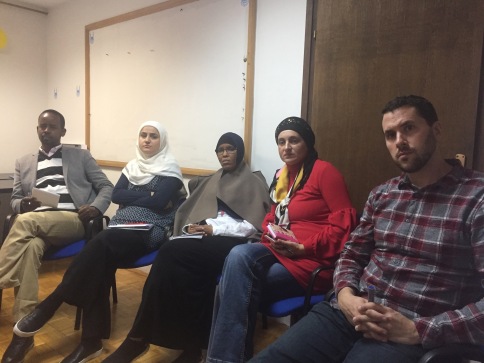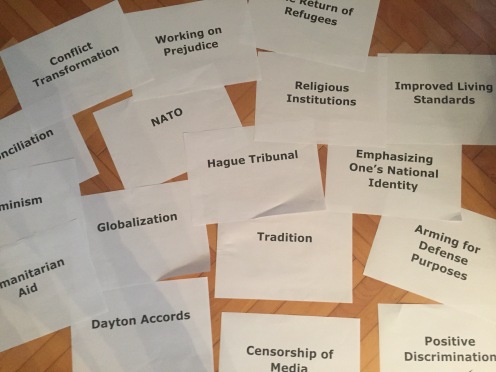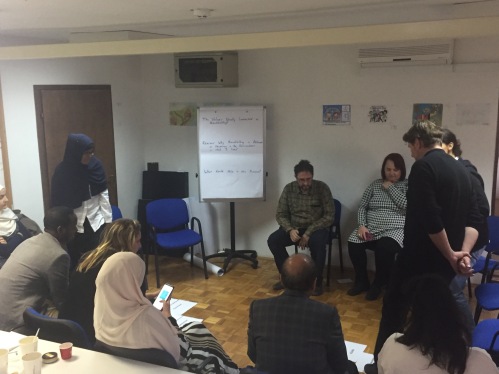On October 23, I had the immense privilege to help Amra Pandžo from Mali Koraci (Small Steps) and Adnan Hasanbegović from the Center for Nonviolent Action (CNA) hold an introductory peacemaking workshop for Islamic Relief staff from Sweden and Bosnia. Recently, Islamic Relief Sweden has begun receiving funding for peace work and humanitarian projects in divided and war-torn societies. Because Islamic Relief is traditionally a Muslim humanitarian aid organization (and not a peacemaking organization), Islamic Relief staff from Bosnia were hosting staff from Sweden in order to provide additional training regarding peace work from local Bosnian peacemaking practitioners. It was such a privilege to be present and help facilitate the training!

So much of peace work is about developing the capacity to see points of view from another’s perspective. Developing the ability to step outside your own experience and genuinely empathize with another person’s point of view can be challenging and uncomfortable. Peacemakers often find themselves trying to build a bridge of understanding back to their own community, so that they can understand another community a bit more accurately and empathically. For me in multi-faith peacemaking between Christians and Muslims, this means that I’m often helping Christians develop a more accurate and empathic understanding of a Muslim’s perspective. For Muslim Bosnian colleagues of ours, that often means that they help their own community (Muslim Bosniaks) develop a greater capacity to understand and empathize with Christians’ perspectives (be they Orthodox Serb, Catholic Croat, or Protestant).
While this introductory training was not a multi-faith or inter-religious peacemaking training, it was an incredible privilege to be able to be present as a Christian in a room full of Muslims doing the hard work of empathizing with alternative perspectives. Ideas and topics like the Hague Tribunal, Forgiveness, the Return of Refugees, Trust, the Dayton Accords (which ended the Bosnian War), Religious Institutions, Media Censorship, and even Reconciliation itself generate a wide variety of emotions and reactions from diverse audiences in Bosnia and Herzegovina.

This group of Islamic Relief staff was especially impressive, perhaps in part due to the fact that many of them have lived as refugees, having fled from war in Somalia and Bosnia to live in Sweden. This unique experience seemed to have given them a natural ability to empathize deeply with other perspectives.
The most fascinating part of the conversation to me centered on the topics of forgiveness, whether fully forgiving another requires that we forget the injustice that occurred, and whether and how we can or should trust those that did us harm. Having witnessed similar conversations among Christians, it was quite fun to see one especially devout Muslim quoting from the Qur’an to justify the fact that “God commands that we forgive AND forget” (especially when the offender has repented of wrongdoing). The conversation circled around to the fact that we must forgive others if God is to forgive us (Qur’an 64:14; cross reference Matthew 6:14-15). Several others shifted uncomfortably as they shared from their own experiences of suffering that they thought it was both impossible and unwise to forget. Instead, they emphasize that the journey of forgiveness was profoundly personal, and that although it is healthy to let go of wounds to allow them to heal, forgiveness cannot be forced. Even more, they proposed, victims cannot simply begin to trust perpetrators after having been harmed. To mandate such a process of forgetting is both unhealthy and unwise.

It was fun to reflect back to the group my own experience among Christians wrestling with these same ideas. God would have us forgive, and part of that process may include “backgrounding” (Miroslav Volf uses this word rather than “forgetting” in Exclusion & Embrace) the wrong we have experienced in some fashion. Only by backgrounding wrongs we’ve suffered can we begin to fully heal and move beyond victimhood. But can we forget? How and when can trust begin to grow again, if it should at all? Must a perpetrator repent before we forgive, and what does forgiveness require of us? Muslims and Christian alike wrestle with similar questions.
I’m always impressed by how much more deeply we can journey together in conversations across religious boundaries when we open ourselves up to genuinely hear another’s experience and “background” our own desire to change another person, be it their belief system or their actions. It’s only on that journey, when we’re open to one another without agenda, that we can explore the deepest and most important topics about God and God’s character or will, how we might follow God, and how we might love our neighbor and those who are different.

Leave a comment